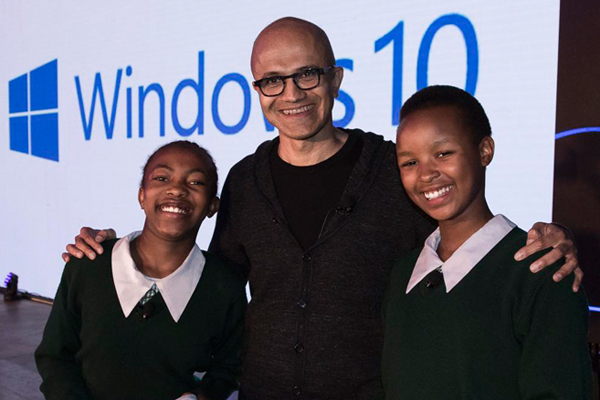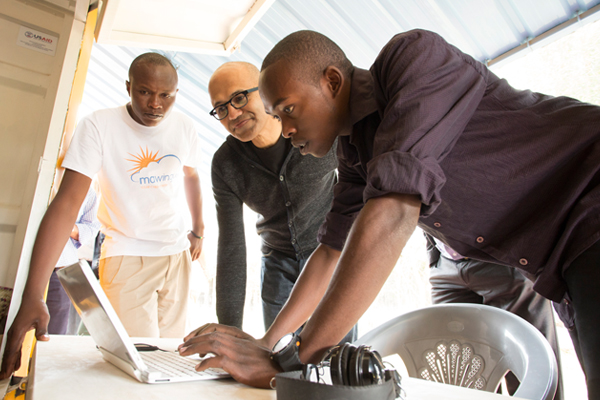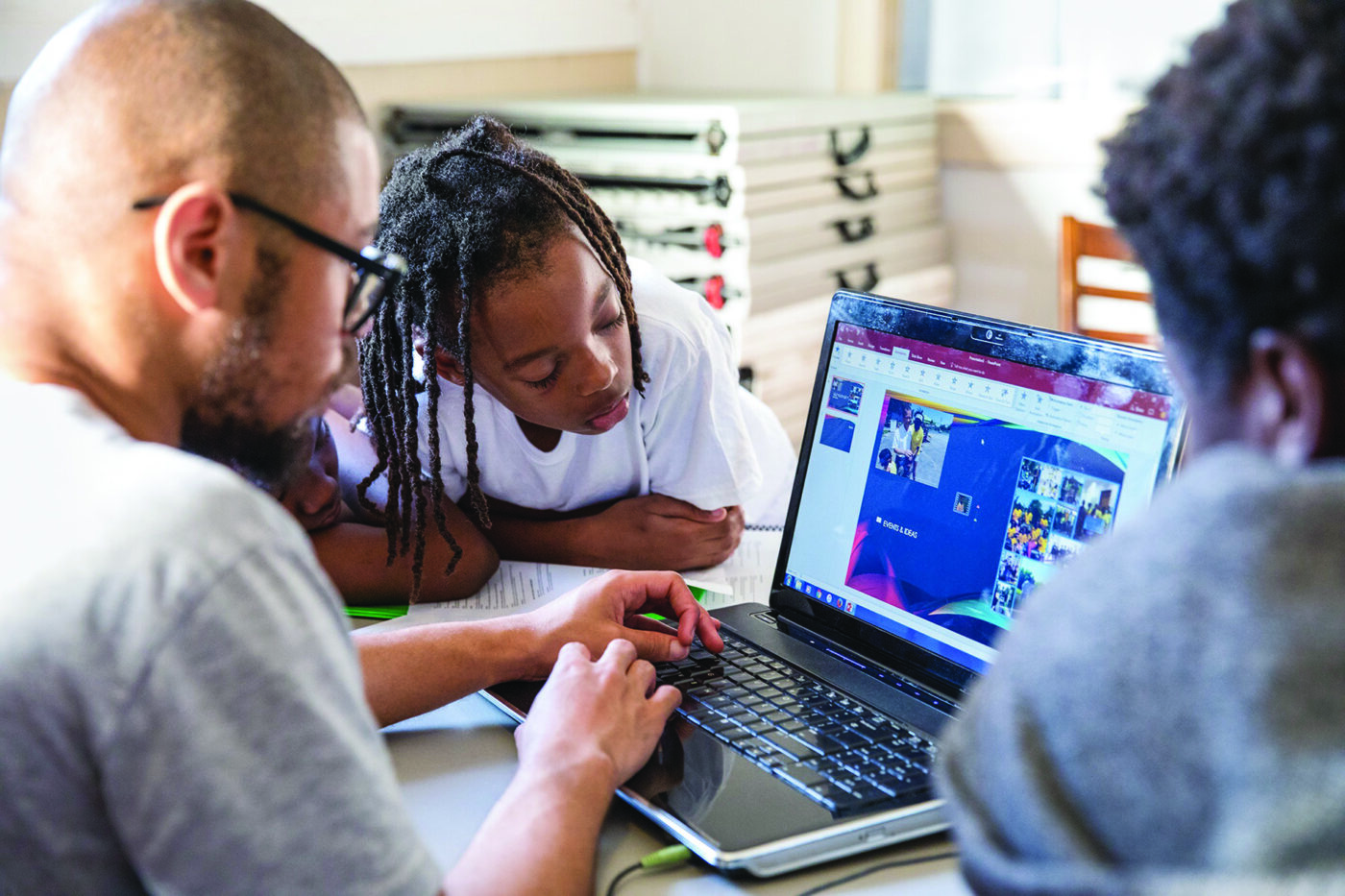#12
MICROSOFT
EMPOWERING EVERY PERSON AND ORGANIZATION TO ACHIEVE MORE
Microsoft set up operations in Kenya 22 years ago. Initially, the team was primarily from its global sales and marketing functions before the operation quickly evolving to include additional investments such as the 4Afrika initiative, the Africa Development Center (ADC) and the Microsoft Africa Research Institute (MARI) .
In 2013, the 4Afrika initiative was launched continent wide to formalize Microsoft’s investment in access, skills and innovation. The access pillar focuses on accelerating affordable access to internet and technology while the skills pillar would be about developing the digital talent pipeline and improving employability through a blended learning approach. With the need to encourage innovation in Africa, the innovation pillar invests in locally relevant initiatives for economic growth and societal impact. The seriousness of Microsoft’s focus in the country would best be seen by the choice by the organization to launch its latest windows product (windows 2010) in Nanyuki in July 2015. This was a global launch streamed live from Kenya for the world to appreciate the global firm’s focus in Kenya and Africa as a whole.
In 2017, Microsoft launched the policy innovation center (PIC) , in collaboration with the Strathmore University. PIC was a first-for-Africa platform that would bring together academia, the public and the private sector to engage in policy discussions around the use of technology in key sectors, including Justice, Health, Education, Financial Services, Data Protection and Privacy. The purpose of the PIC was and is to incubate and fast-track the development of enabling policies. The outcomes of the engagements here, have proven valuable in the data rich era even as the country with its key industry players continue to adopt technology for daily use.

Notable Investments
Airband
Africa has unique infrastructure needs that data centers, fiber and mobile wireless networks have struggled to address in providing internet connectivity at a reasonable cost. The international commitment to Airband was formalized in October 2019 when Microsoft announced it would partner to bring access to 40 million unserved people in Africa and Latin America by 2022.
Through the Airband initiative, Microsoft is partnering to incentivize and develop infrastructure that is uniquely needed in Africa, which in turn drives cloud and edge solutions. Airband partnerships typically result in the deployment of hybrid fixed wireless networks that leverage technologies and spectrum including TV white spaces (TVWS) that are more cost-effective than fiber and mobile wireless for delivering broadband to unserved rural communities. Cloud and edge solutions built on top of Airband infrastructure include Mkopa, SunCulture, New Sun Road and ColdHubs. These are Kenyan homegrown start-ups that have benefited from Microsoft’s investments and that serve the bottom of the pyramid to drive inclusivity.
Africa Development Centre (ADC)
Microsoft launched its first (ADC) on the continent in May 2019, with an initial site in Nairobi, Kenya and another in Lagos, Nigeria. The center, which is Microsoft’s 7th globally, has recruited and continues to recruit world-class African engineering talent to develop innovative solutions that span the intelligent cloud and intelligent edge and whose skills apply to programs utilized by Microsoft customers globally.
Through the ADC, Microsoft plays an active role in developing the tech ecosystem by engaging with students with the goal of contributing towards skills development within the region. This then forms the pipeline of recruitment, giving local talent an opportunity to thrive and plug into the organization. Currently, ADC has employed over 300 engineers to date.
The Microsoft Africa Research Institute (MARI)
While naturally other organizations were slowing down on their investments post Covid-19-Pandemic, Microsoft took the decision to launch MARI in 2020 with its base in Kenya. MARI’s mission is to understand, build and deploy innovative cloud and AI technologies (to power globally relevant innovations) in the areas of work, society and health. With the center based in Kenya, it creates another avenue for employment for researchers and engineers in Kenya as well as an opportunity for the country to contribute to Africa’s research backed tech landscape.
Microsoft impact during Covid-19
With the foundation for Microsoft to operate in the country already set and in motion, the unpredicted pandemic formed a right space for Microsoft to expand its investment in the country. As Covid-19 continued to impact people and countries around the world, Microsoft understood the need to live up to its mission of empowering every person and every organization in the planet to achieve more. For Kenya in particular, the organization focused on various initiatives that include:
Remote Work
Given how abruptly the pandemic hit, various players of the economy were forced to work remotely or adopt a hybrid work model. Microsoft moved to provide free access to its collaboration platforms so that businesses, the government and various organizations could transition to the remote working scenario. All with the aim of helping keep the economy running in as much as was viable. Over a year later, organizations and individuals have learnt to co-exist with the pandemic, and a new way of working remotely has been adopted as the new normal. As such, for many individuals and organizations, Microsoft Teams videoconferencing, chat and collaboration continue to play an important role in helping people continue to work and collaborate. As teams of people everywhere are adopting to hybrid work, Microsoft is committed to helping businesses, schools and communities navigate these challenging times.

Supporting Health sector
Health is key sector where Microsoft collaboratively deployed a chatbot Solution for citizen engagement built and hosted on Azure. This was integrated into the National Covid-19 communication plan with key digital connections Government channels and is accessible via all social media platforms including USSD code integration.
Access to Justice
The firm provided Microsoft Teams to the Judiciary to facilitate Online Trials/Hearings/Meetings. This was after conducting training for all the Court of Appeal Judges and the Judiciary ICT team to enable them to support the court operations. The Court Management solution modernizes justice systems, moving courts away from legacy IT and paper-based procedures for criminal, civil, and traffic cases. The approach continues to be used to date.
Enabling Remote Learning
Microsoft’s support for both the public and private education sector has been pegged on fostering use of modern tools in the classroom, developing 21st century digital content and providing capacity building for teachers to enable hybrid learning.
To this effect, Microsoft equipped over 200,000 teachers in Kenya with Microsoft Office 365 tools to support hybrid learning and collaboration through MS Teams in partnership with the Ministry of Education, Teachers Service Commission and Kenya Private School Alliance. This collaboration extends to the Kenya Institute of Curriculum Development to enable all students access digital learning content online through Kenya Education Cloud.
In addition, Microsoft is working with KENET and several private and public Universities to provide anytime everywhere access to secure productivity and collaboration tools as well as the ability to cost effectively leverage efficient and reliable infrastructure from anywhere in the country. This has greatly boosted the accelerated transformation of the higher education programmes to ensure continuity of learning and improved learning experiences. Additionally, Microsoft is working closely with the Academic studies departments to provide for free Microsoft Learn. Microsoft Learn platform is available to all institutions of higher learning as part of Microsoft’s contribution to ensure all the students are 21st Century ready at the completion of their academic studies. Microsoft’s goal is to continuously empower a minimum of 1 million higher education students each year.

Skilling
Around the world, 2020 to date has emerged as one of the most challenging years in many of lifetimes. In one year, the world has endured multiple challenges, including a pandemic that has spurred a global economic crisis. As societies reopen, it’s apparent that the economy will never be the same again. Increasingly, one of the key steps needed to foster a safe and successful economic recovery, is expanded access to the digital skills needed to fill new jobs.
To help address this need, Microsoft launched a global skills initiative aimed at bringing more digital skills to 25 million people worldwide by the end of 2020. The initiative brought together every part of Microsoft, combining existing and new resources from LinkedIn, GitHub, and Microsoft. It was grounded in three areas of activity:
- The use of data to identify in-demand jobs and the skills needed to fill them;
- Free access to learning paths and content to help people develop the skills these positions require;
- Low-cost certifications and free job-seeking tools to help people who develop these skills pursue new jobs.
By March 2021 the program had helped over 30 million people in 249 countries and territories gain access to digital skills, topping its initial goal of 25 million last June, and is extending the company’s commitment to help 250,000 companies make a skills-based hire by the end of 2021.
In Kenya, Microsoft is working with the likes of Tech4Dev and the Women Techsters Initiative to train 5 million girls and women across Africa in coding and deep tech skills by 2030. In February, Microsoft also partnered with the Stanbic Bank Foundation in Kenya – signing a Memorandum of Understanding (MoU) with the Ministry of Industrialization, Trade, and Enterprise Development to enhance the employability of citizens through digital upskilling to over 50,000 entrepreneurs.
This is in addition to ongoing programs aimed at different groups such as
















